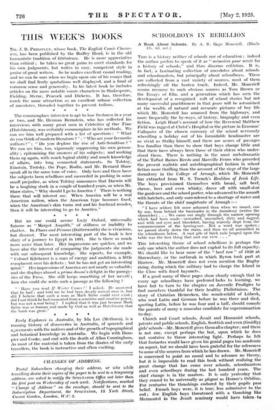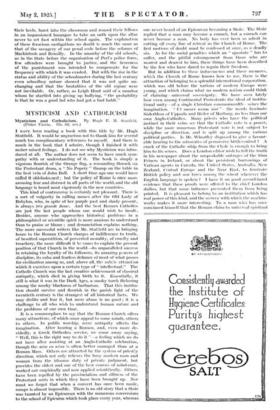SCHOOLBOYS IN - REBELLION
This is a history neither of schools nor of education ; indeed the author prefers to speak of it as " memoires pour servir for a history of schools," and thus disarms criticism. It is, in fact, a fascinating collection of anecdotes about schools and schoolmasters, but principally about schoolboys. These are collected from a vast variety of sources, most of them refreshingly off the beaten track. Indeed, Mr. Monerieff scorns recourse to such obvious sources as Tom Brown or the Essays of Elia, and a generation. which has seen the development of a recognized cult of school stories but not many successful practitioners in that genre will be astonished at the wealth of natural and accurate pictures of boy life which Mr. Moncrieff has amassed from the highways, and more frequently the by-ways, of history, biography and even fiction. Leigh Hunt's account of how the Reverend Matthew Field was ragged at Christ's Hospital or the picture in Erasmus' Colloquies of the chosen emissary of the • school nervously wheedling a holiday out of his formidable headmaster are as vivid as Stalky himself, and there are scores of passages
less familiar than these to show that boys change little and that there have always been those of their elders who under- stood them. There is nothing in the mbst melodramatic of the Talbot Baines Reeds and Manville Fenns who preceded the present realistic and autobiographical fashion in school fiction more thrilling than the account of the siege of the large
dormitory in the College of Armagh, which Mr. Moncrieff has extracted from W. S. Trench's Realities of Irish Life.
The boys provisioned themselveS with bread, • salt beef, cheese, beer and even whisky,- drove off with small-shot the gardener and the school porter, who advanced to the assault with hatchets, and only surrendered to a shortage of water and the threats of the chief magistrate of Armagh :- - " I have seldom felt more ashamed than when we issued, 'one by one, from behind the barricades in the dormitory (writes the chronieler).. . . We came out singly through the narrow opening which had been made—unwashed, uncombed, dirty and ragged, and with red eyes and bloodshot, having scarcely slept from the commencement of the barring-out. Not a word was spoken ; we passed slowly down the stairs; and then. we •all assembled in the schoolroom below. A vast pile of birch rods heaped upon the table was the first thing that met our view . . ."
This interesting theme of school rebellions is -perhaps the only one which the author does not exploit to its full capacity. We should like . to hear more- of the . " beef row " of 1829 at Shrewibury, or the outbreak in which Byron took part .at Harrow. Mr. Monerieff does not even mention. the Rugby rising, during which the military had to charge the Island in the Close. with fixed bayonets.
If a good. many of these pages show clearly enough that in every age -schoolboys have preferred larks _ to learning, we have but to turn to. the chapter on Juvenile .Prodigies to find ourselves thankful for their healthy Philistinism. The story of Christian Heinecken, the wonderchild of -Lubeck, who read Latin and German before he was three and died, quoting Latin, before he was four and a half, should console the parents of many a muscular candidate for superannuation to-day.
Church and Court schools, Jesuit and Humanist schools, private and public schools, English, Scottish and even (timidly) girls' schools—Mr; Moncrieff gives them all a chapter; and there is not one, except perhaps the last, . upon which he does not contrive to throw interesting light. Perhaps he felt that footnotes would have given his genial pages too academic an aspect, but we should have been grateful for the references to some of the sources from which he has drawn. Mr. Monerieff is concerned to -point .no moral and to advance no theory, but it is impossible to read this book without realizing the great change that has . come over schools, schoolmasters and even schoolboys during the last hundred years. The chief change is in the masters. It is only yesterday that they ceased to be universally as plagosi as Horace's Orbilius. For centuries the thrashings endured by their pupils pass belief. French boys were, it is true; less submissive to the rod ; few English boys threatened with a thrashing- like Marmontel in the Jesuit seminary would -have taken•tt, their heels, burst into the classroom and roused their fellows in an impassioned harangue to take an oath upon the altar never to set foot within the school again. The explanation of these ferocious castigations no doubt is much the same as that of the savagery of our penal code before the reforms of Mackintosh and Romilly. In the anarchy of the old schools, as in the State before the organisation of Peel's police force, few offenders were brought to justice, and the fierceness of the punishment was intended to compensate for the frequency with which it was evaded. But with the rise in the status and ability of the schoolmaster during the last century even schoolboy nature showed that it was not quite un- changing and that the brutalities of the old regime were not inevitable. Or, rather, as Leigh Hunt said of a monitor -whom he startled into giving up bullying, " the probability is that he was a good lad who had got a bad habit."











































 Previous page
Previous page